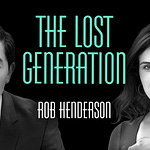I recently spoke with Richard Hanania to review the 2015 film Look Who’s Back (watch on YouTube), a German film with the premise that Hitler returns to life and becomes a successful media personality and entertainer.
Some highlights:
I expected a triumphalist fable—modern enlightened citizens rebuking Hitler’s ugly and retrograde views. Instead, people are fascinated by him
Hitler wakes up in modern Berlin, is disgusted with right and left politics and becomes a supporter of the Green Party. At first this is played for laughs, then you remember Hitler was an artist, vegetarian, and animal rights supporter and it all makes sense
Watching this movie now feels like peering into a time capsule—2015, pre-Trump, pre-Brexit, before the migrant crisis, before the rise of populism back when western elites were more confident in their world view
The plausibility of the plot was striking. The idea that someone like Hitler could reappear, charm the public, and become massively popular—well, that doesn’t seem so far-fetched anymore. So on second thought perhaps the film was prescient
How audiences respond to taboo figures. People laugh, not just because it’s funny, but because they’re testing the boundaries of what’s permissible in polite society
Comedy as a Rorschach test. What you laugh at reveals what you fear, what you desire, and what you’d rather not admit about yourself
Charisma as a morally-neutral social technology—confidence, fluency, timing—that enables coalition-building
I share some of my memories of when I was stationed in Germany more than a decade ago, right around the time this film came out
We kept circling one question: when satire makes a monster compelling, does it inoculate people, or make them more open to supporting such a person?
The closing scenes at the end (implicitly condemning real-world anti-immigrant demonstrations) at the end functions like a permission slip: as long as the film explicitly condemns the right people, audiences can forgive themselves for enjoying the film
The film seems to support the Great Man theory of history: drop a hyper-confident and effective person into any era and followers will gather
Of course, “Great Man” doesn’t mean “good man.” I’m reminded of a quote from the Russian-British philosopher Isaiah Berlin: “Great men can be very bad men. Stalin in my sense was a great man. He was one of the very worst men who ever lived, but he made of Russia something which would not have happened without him, even if the result was appalling. So were Hitler, Mao and other monsters. De Gaulle was a great man of a kind. He made a permanent difference to France; but he was a human being, unlike the others. Great men leave permanent effects.”
In psychometric terms, being in the tails of multiple distributions—intelligence, conscientiousness, charisma, dominance, stagecraft—can produce “great man” effects
Richard informs me that the real-life Adolf Hitler forced his German Shepherd Blondi to be poisoned with a cyanide capsule one day before he himself committed suicide
We discuss Mein Kampf’s propaganda chapter (Richard’s reaction when I asked him if he’s ever read it is entertaining) and Hitler’s claim that simple, repeated messages are more influential than arguments that persuade sophisticated people
Hitler doesn’t badmouth Jews, no swipes at gay people. He instead talks about how bad Turks and immigrants are. Maybe the idea is that regardless of where he finds himself, Hitler would get a feel for who people secretly dislike, and exploit that to fuel his own political ambitions
Carl Jung, when asked about Hitler, said “Hitler is the mirror of every German’s unconscious…He is the loudspeaker which magnifies the inaudible whispers of the German soul until they can be heard by the German’s unconscious ear. He is the first man to tell every German what he has been thinking and feeling all along in his unconscious”
We also speak about Steven Pinker’s remarks about the role of laughter in social life in his new book When Everyone Knows That Everyone Knows…
Much more










